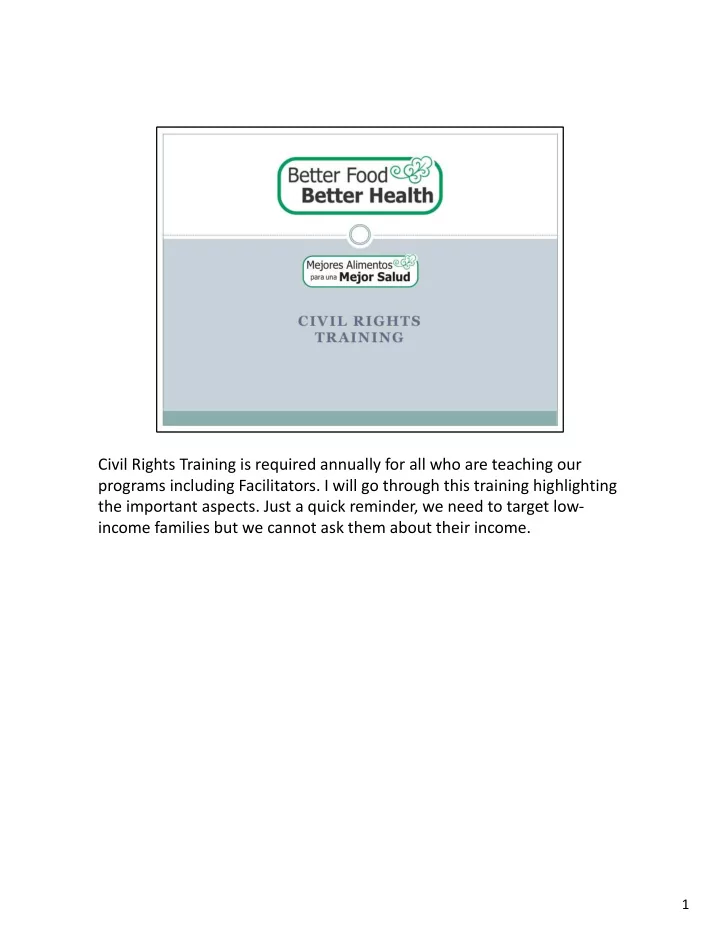

Civil Rights Training is required annually for all who are teaching our programs including Facilitators. I will go through this training highlighting the important aspects. Just a quick reminder, we need to target low- income families but we cannot ask them about their income. 1
The state develops Civil Rights training for use by its departments and its contractors, of which we are one. We will be using the state training presentation to guide us through this next section. 2
It is essential that we confirm that everyone teaching our program has had Civil Rights training and understands: Civil Rights Laws Unlawful Discrimination How to serve everyone in a consistent manner across all federally funded programs It is also essential that we keep a log of attendance that goes into our annual files so it’s available for our state review. 3
The purpose of this training is: -To review the laws affecting how we provide services to consumers. -To understand what it means to treat customers, and each other fairly, and with dignity & respect. -To understand our moral, and legal obligation not to discriminate against anyone during the course of our work. 4
There are a number of pieces of legislation starting in 1964 that cover civil rights and prohibit discrimination based on race, color, national origin, sex, disability, age, religious creed, and political beliefs. 5
There are specific laws covering program and building accessibility, limited English proficiency, and foster and adoptive care as they are related to civil rights and prohibiting discrimination. 6
Here are additional resources if you want to look closer at any of these laws. 7
Limited English Proficiency is one of the situations covered by the civil rights laws. The term LEP refers to individuals that do not speak English as their primary language. It may also refer to those who have limited ability to read, speak, write, or understand English. For more information visit www.LEP.gov 8
Here are strategies and steps to take to eliminate barriers for Limited English Proficiency consumers. 9
This poster is related to Limited English Proficient and lets consumers know of the availability of interpreter services. 10
An interpreter would verbally aid a Limited English Proficiency consumer, while a translator would assist through written communication. 11
There are a number of options for interpreter and translation services. 12
In a Division of Social Services office they would have access to this form. 13
The United States Department of Agriculture defines Unlawful Discrimination as…. “The act of distinguishing one person or group of persons from others, either intentionally by neglect, or by the effects of actions, or lack of actions in comparison with others who are not members of the protected group.” 14
All persons applying for, receiving or participating in any federally assisted program or activity are protected against discrimination on the grounds of: Race • Color • National Origin • Sex • Age • • Disability • Religion, or • Political Beliefs 15
Here are some examples of unlawful discrimination – For example, failure to provide an interpreter and/or translated written materials to Limited English Proficiency applicants is an unlawful practice because it is a barrier to participation. 16
Even though we believe that we are seeing and treating people as equals, hidden biases may still influence our perceptions and actions. Here are some examples of prejudice and stereotyping, which are forms of bias. For more information you can visit the website www.tolerance.org 17
Filing a complaint with the local, state, or federal agency is a basic right. Consumers are entitled to due process, and an appeal. When a consumer alleges discrimination and wants to file a complaint: Direct them to the County DSS Civil Rights Coordinator Provide them with the number Transfer the call, or Direct them to the online form at 18
There is a civil rights coordinator who will facilitate the process and follow through with the consumer. 19
This poster includes the nondiscrimination statement and ensures the public has access to the complaint process. I would think that you likely have this poster in your offices and where you will deliver programs. 20
All Food and Nutrition Service assistance programs are required to have a public notification system to inform consumers of: 1. Program Availability 2. Complaint Information – advising consumers of their right to file a complaint, and how to do so. 3. Non-Discrimination Statement – displayed on the “Justice for All” poster. 21
State and local agencies are required to obtain race, ethnicity and other demographic information to: • Determine the effectiveness of FNS programs related to reaching potentially eligible populations • Identify areas where additional outreach is needed • Compliance review location selection 22
These are the racial and ethnic data that are collected, and are what you see reflected on our program rosters and enrollment forms. 23
This specific process is for Division of Social Services (DSS) offices, but as I mentioned at the beginning as a contractor with the state, we have a management evaluation review every other year where we are asked about civil rights. 24
Here is what happens if non-compliance is found. 25
Carlotta Dixon is the North Carolina Civil Rights Coordinator and can be contacted through these methods. 26
USDA and Health and Human Services also have Civil Rights offices. 27
This concludes the Better Food Better Health Facilitator Training. To really get a grasp of the material, you should review your Facilitator Notebook. You will discuss your role with the Agent who will answer your questions. Any questions that the Agent might not be able to answer, he or she will direct to us. Thank you so much again for being a Facilitator. Muchas gracias y bienvenidos a Mejores Alimentos para una Mejor Salud! 28
Recommend
More recommend